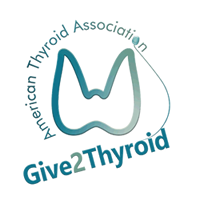ABBREVIATIONS & DEFINITIONS
 TSH: thyroid stimulating hormone – produced by the pituitary gland that regulates thyroid function; also the best screening test to determine if the thyroid is functioning normally.
TSH: thyroid stimulating hormone – produced by the pituitary gland that regulates thyroid function; also the best screening test to determine if the thyroid is functioning normally.
Thyroxine (T4): the major hormone produced by the thyroid gland. T4 gets converted to the active hormone T3 in various tissues in the body.
Triiodothyronine (T3): the active thyroid hormone, usually produced from thyroxine, available in pill form as Cytomel™.
Hyperthyroidism: a condition where the thyroid gland is overactive and produces too much thyroid hormone. Hyperthyroidism may be treated with antithyroid meds (Methimazole, Propylthiouracil), radioactive iodine or surgery.
Subclinical Hyperthyroidism: a mild form of hyperthyroidism where the only abnormal hormone level is a decreased TSH.
Thyroid scan: this imaging test uses a small amount of a radioactive substance, usually radioactive iodine, to obtain a picture of the thyroid gland. A “cold” nodule means that the nodule is not functioning normally. A patient with a “cold” nodule should have a fine needle aspiration biopsy of the nodule. A “functioning”, or “hot”, nodule means that the nodule is taking up radioactive iodine to a degree that is either similar to or greater than the uptake of normal cells. The likelihood of cancer in these nodules is very low and a biopsy is often not needed.
Autoimmune thyroid disease: a group of disorders that are caused by antibodies that get confused and attack the thyroid. These antibodies can either turn on the thyroid (Graves’ disease, hyperthyroidism) or turn it off (Hashimoto’s thyroiditis, hypothyroidism).
TPO antibodies: these are antibodies that attack the thyroid instead of bacteria and viruses, they are a marker for autoimmune thyroid disease, which is the main underlying cause for hypothyroidism and hyperthyroidism in the United States.




